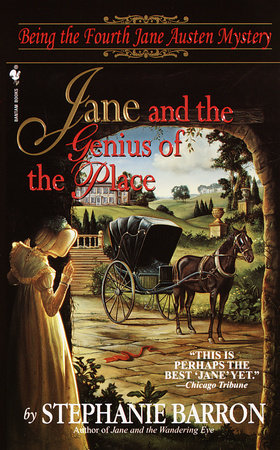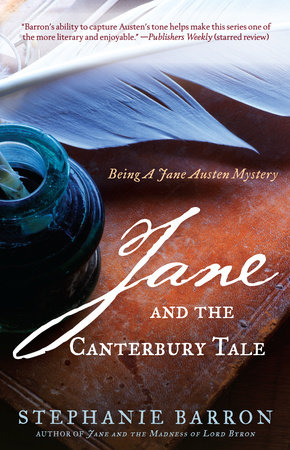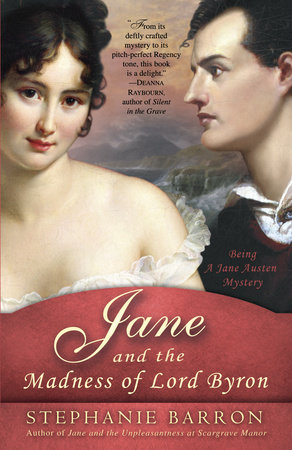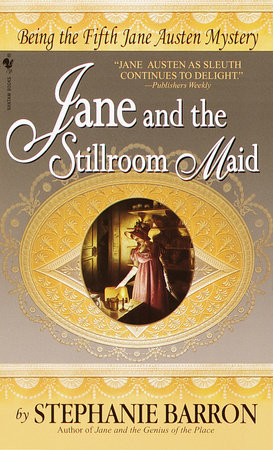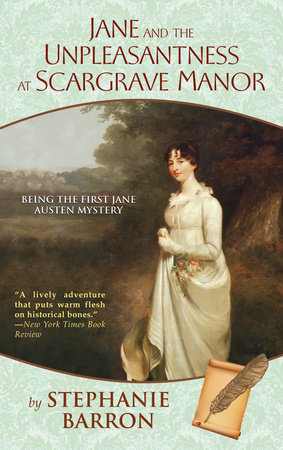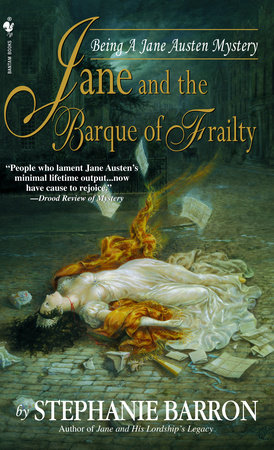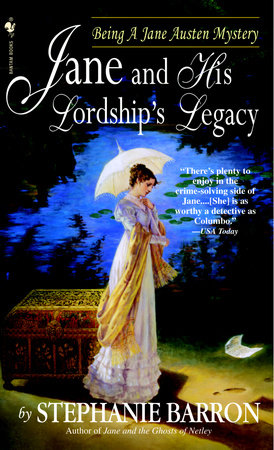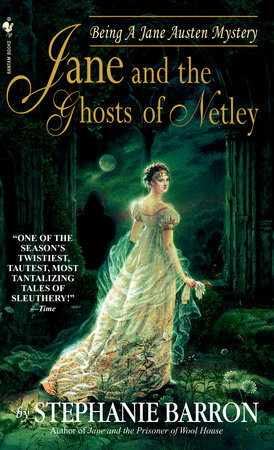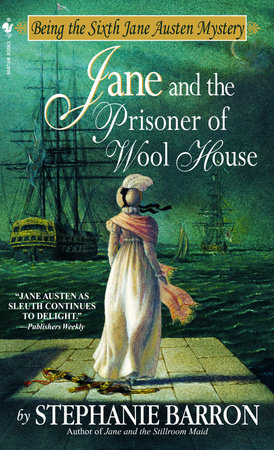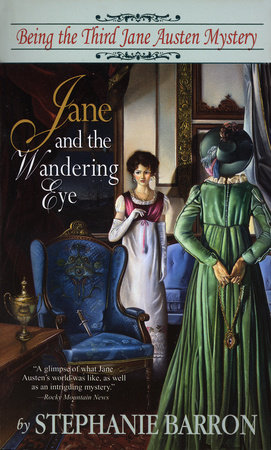Excerpt
Jane and the Genius of the Place
It was a chastened and despondent Henry who rejoined the Godmersham party a half-hour later.
"I am sure that some great mischief has befallen the poor beast." He sagged against the seat cushions and accepted a glass of ginger beer. "He looked off in the near hind. Perhaps the weights--"
"He looked off for the duration of the heat, my dear brother," said Neddie sourly. He was quite winded, and much put out at the devil's chase he had run. "Although I confess my position was too poor to permit of a good view. We should better have gone mounted, like Mrs. Grey."
As tho' conjured by my brother's thought, the figure in scarlet pranced into view near the stylish perch phaeton. She dismounted with a flourish, and thrust the reins at her tyger. Behind her, at a discreet pace, advanced the filly Josephine and her jockey--both looking whipped by the very hounds of Hell, as perhaps they had been. It cannot be comfortable or easy to race in a determined heat, with most of Kent at one's heels.
Mrs. Grey tossed a beautiful gold plate--Canterbury's Race Week prize--into the perch phaeton, with as much disregard as tho' it were a pair of old shoes. She handed a small leather coin pouch to the jockey, and reached a gloved hand to pat the filly's lathered flank. Then, with an insouciance possible only for one who moves under an hundred eyes, she stepped into her carriage, took up the reins, and snapped them smartly over the matched greys' necks. Several of the watching gentlemen cheered. The tyger touched his cap as she turned, his expression wooden; then he and the jockey led their mounts slowly through the milling crowd, in the direction of the stableyard.
"What did I tell you?" Lizzy said languidly. "She shall be established on her sofa while the rest of us are still trapped on the Canterbury road. Detestable woman."
"Do not speak of her, pray." Henry took a long draught. "My dear Eliza will have it that there is nothing like a Frenchwoman for winning, you know--and I declare I begin to be of her opinion. Did you see that grey-eyed jade, Neddie, spurring her mount for all she was worth?"
"I believe Mrs. Grey's eyes to be brown, Henry," my brother absently replied.
"Grey--brown--but upon my word, the Furies ain't in it! I might almost believe her to have cursed the Commodore as he rounded the rail. She has quite the look of the witch about her, however much she affects a veil."
"Now, Henry." I patted his hand. "Let us have no conduct unbecoming to a gentleman. You are to be an example for the children, in this as in so many things. Your disappointment may serve as a cautionary chapter in the annals of the Sporting Life. I see the illustration now, in my mind's eye: A Gentleman Unbowed by the Vagaries of Fortune."
"--However driven upon the poorhouse," he muttered, unreconciled.
"The poorhouse!" I smiled at him conspiratorially, and dropped my voice to a whisper. "Then take comfort, Henry. You shall not travel there alone. The excellent Mr. Bridges is to cheer your solitude, for he named the Commodore as the salvation of all his hopes."
"Am I then to encompass others in my ruin?" Henry groaned in mock despair. "The reproaches that shall be mine! And how am I to face Lady Bridges, his redoubtable mother? I suppose we may expect the unfortunate curate to wait upon us at Godmersham before the day is out?"
"He had better wait upon Mrs. Grey," said Neddie, who had caught something of our conversation. "She is undoubtedly more amenable to charity at present."
"A debt of honour is a debt of honour." Lizzy picked desultorily at the points of her gloves. "No lady would forgive what a gentleman would exact; it does violence to the equality of the sexes."
"You have been reading that wretched Wollstonecraft again," my brother said in exasperation. "I shall burn the volume tonight."*
*Edward refers to
A Vindication of the Rights of Woman, by Mary Wollstonecraft, first published in 1792. Elizabeth Austen was educated at an excellent finishing school in London, known as "the Ladies' Eton." It may be there that she fostered her interest in women's issues. In 1808, she signed her name in a work written by the radical London feminist Mary Hays.
--Editor's note."May we leave now, Papa?" Fanny implored. "I am most dreadfully hungry."
"Hungry!" Neddie searched in the depths of the picnic hamper.
"And not a scrap of jellied chicken left for your fainting father? Scamp!" He pinched his favourite's dimpled cheek. "We shall take to the road directly I secure a draught of ale, Fanny. I have a thirst upon me that would parch the Stour itself."
And so he moved off, intent upon a tankard. Most of the gentlemen of the neighbourhood were roving about the meeting-grounds, exchanging tales of woe or victory; some had placed their money on Mrs. Grey's filly, others on Henry's horse, still others on one of the mounts deep in the pack, who had fared no better than the Commodore. A great deal of hearty laughter and slapping of backs ensued, for which I had little temper; I was fatigued and overheated myself, and longing to be out of my ravishing lilac habit.
"There is my brother Edward," Lizzy observed, "looking bound for the gallows before sunset. You have much to answer for, Henry; I am not sure I should admit you to Godmersham this e'en! Look at the poor fellow--so chapfallen and mumchance! Were it not for the support of Captain Woodford's arm, I doubt he could place one foot before the other!"
And, indeed, Mr. Bridges looked very unwell. His countenance was flushed, his fashionable coiffure disarranged, and his cravat askew. He clutched at his head--which ached, no doubt, from an unfortunate blend of spirits and wine--and muttered indistinguishable words in Captain Woodford's ear. A glance for his sister, and it seemed as tho' he might approach our barouche--until a third man came up with him suddenly, and tore at Mr. Bridges's arm. He was a burly gentleman, with sweeping whiskers and a raffish air; a gentleman I knew of old. Denys Collingforth, of slim means and illiberal temper, who was held in general disfavour by the whole neighbourhood. We should have seen much of the Collingforths, had they proved more genteel, for they lived but a few miles from Godmersham, at Prior's Farm. He was fond of using his fists at the slightest provocation, and was even said to have struck his wife--the unfortunate Laetitia, whose carriage Mrs. Grey had entered only an hour or so before.
I had seen Denys Collingforth in more than one unsavoury moment, during my many sojourns in Kent; and his present appearance argued the immediate precipitation of another. He twisted the sleeve of Mr. Bridges's elegant coat, all choler and ill-humour in a single motion.
The curate gasped, and attempted to shake him off; but he succeeded only in securing both of Mr. Collingforth's hands firmly about his lapels. The gallant Captain Woodford attempted to intervene--and was thrust heavily to one side.
"Lizzy!" I half-rose from my seat. "What
can Mr. Collingforth mean by such behaviour?"
Her elegant head came swiftly round, and caught the scene at a glance. "Contemptible blackguard," she spat out, "he will draw Edward's cork in a moment."
Not only the children had proved susceptible to Henry's fighting cant.
And draw Mr. Bridges's cork, Collingforth did. A wide, swinging arc of his fist, and the curate fell backwards, blood spurting from his nose. Captain Woodford fell on his adversary immediately, and the three disappeared in a whirling knot of flailing limbs and brightly-coloured breeches. In a moment, however, Neddie had perceived the difficulty--he and Henry raced to the aid of their friends, along with half a dozen others who had no cause to love Collingforth; and the bully was deftly wrenched from the melee.
Muttering an oath, he retired to nurse his wounds. A man I did not recognise--I suppose I may call him a gentleman--threw an arm about his shoulders and said something softly into his ear. The newcomer was dressed all in black, and wore an expression of contempt on his countenance; but his words seemed to calm his friend.
"There'll be the Devil to pay," Collingforth shouted at Mr. Bridges's dusty back; and then shaking his fist, he moved off through the crowd towards his shabby black chaise.
If his wife was within, she did not dare to show her face.
"Well, Lizzy," my brother said as he pulled himself into the barouche, "I believe it is time we turned towards home. This meeting is become almost a brawl, and I will not have Fanny treated to such scenes."
Lizzy's answer, did she contemplate one, was forestalled by a fearful cry. It was a man's voice, torn with suffering and revulsion, as though he looked upon the face of evil and knew it for his own. It came from somewhere behind us.
I turned, aghast, to enquire of Neddie, and saw my own confusion mirrored in my brother's countenance. And then our entire party was on its feet, and the gentlemen had sprung from the barouche, all fatigue and acrimony forgotten. A crowd had gathered at the open door of Collingforth's chaise. I looked, and then turned swiftly to gather Fanny to my breast. Death is not a sight for the young, however sporting-minded.
For spilling from the carriage doorway, arms outflung in supplication, was the figure of a woman. Her streaming hair was dark, her eyes were staring, and tho' the veil and scarlet habit had been torn from her body, leaving her pale and child-like in a simple cotton shift, I knew her instantly for Mrs. Grey.
And knew, with a chill at my heart, that she would never ride again.


